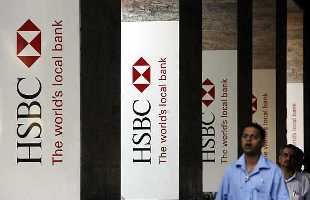 Slowdown in corporate lending and the high cost of doing business in India are forcing a rethink
Slowdown in corporate lending and the high cost of doing business in India are forcing a rethink
Last month, HSBC announced it was shutting its private banking operations in India.
It followed the lead of RBS and Standard Chartered, which earlier this year decided to slim down their India business.
It is believed that Germany’s largest lender, Deutsche Bank, which is reviewing its position globally, could be the next to trim its retail operations.
Drawn by the growing ranks of India’s rich and the banking potential the country presented, foreign banks had India on the top of their mind for expanding their business until a few year years ago.
Now they appear to be seeking an exit from the country.
Competition from local private and public sector banks, which enjoy a large share of the market with no limit on the number of branches they can have, has made India a tough market.
Foreign banks need the Reserve Bank of India’s permission to open more branches, which local banks do not.
Given this challenge, these banks are struggling to increase revenue.
Before HSBC decided to fold its business, its fee-based earnings was a paltry $3-4 million (Rs 20-27 crore).
This is despite data that shows individual aggregate riches in money-related resources in India expanded from Rs 134.7 lakh crore (Rs 1.34 trillion) in 2013-14 to Rs 160.5 lakh crore (Rs 1.6 trillion) in 2014-15, according to Karvy’s India Wealth Report 2015.
This is further expected to grow to Rs 326 lakh crore (Rs 326 tillion) in five years.
Similarly, before RBS sold its private banking unit in India this year to a company led by its head of business, Shiv Gupta, the net balance sheet exposure of the bank’s operations in India fell by £1.7 billion to £2.0 billion.
Experts say cutthroat competition and high staff costs are the main reasons these banks have failed to translate the promise of the region into profits.
The slowdown in corporate lending has added to their woes.
After the 2008-09 crisis, when bad loans in the unsecured segment ballooned, most foreign banks decided to move to safer grounds, focusing mainly on corporate lending.
This meant they became more dependent on business from corporate advisory, mergers and acquisitions and distribution of financial products such as mutual funds.
However, with large companies cutting back their capital expenditure plans over the past three years, the growth in this segment has slowed to 5-6 per cent from double digits earlier. This is mostly due to cutbacks by infrastructure and power companies.
“Corporations haven’t been investing and as a result of this, the pace of lending has slowed,” says Ashvin Parekh of Ashvin Parekh Advisory Services. “Due to high levels of non-performing assets in the corporate sector, banks have also adopted a cautious approach, slowing credit growth further.”
“So, for foreign banks, the potential they see in India remains latent.
And, therefore, India continues to be an imperfect market,” he adds.
Going local
Globally, there has also been a trend towards de-consolidation of large banks.
RBS, for example, after posting a loss of £3.5 billion on the back of a hit by a £4-billion write-down on US Business Citizens and a tax charge of £1.9 billion, decided to wind down its operations in 13 countries.
RBS said it wanted “to focus on becoming a very good bank in the UK instead of becoming a global bank”.
“If you look at individual jurisdictions, there is the cost of compliance -- the capital rent across different geographies.
I think this has to come down,” says Pramit Jhaveri, chief executive officer, Citibank India.
Given the high cost of doing business, Jhaveri says it is not feasible to follow diverse strategies in different markets, even if the region has potential.
At the same time, regulatory changes are calling for foreign banks to make investments on a grand scale in India.
RBI, for example, is looking at making it mandatory for foreign banks to convert their India operations into a wholly-owned subsidiary if they want parity in terms of regulations with local banks.
RBI has said if foreign banks take this route, they would be given capital gains tax and stamp duty benefits and allowed to acquire local private banks. However, foreign banks are not enthused.
Experts believe if RBI forces banks to compulsorily take the wholly-owned subsidiary route, then there will be further exits from the market.
Meanwhile, even as it rethinks its India business, Deutsche Bank is optimistic about its future.
“I think today we are in a much better position to actually take advantages of markets and economies,” says Ravneet Gill, CEO, Deutsche Bank, India.
“If you look at the physical presence foreign banks have and the actual market share we have, the two are very different.
Market share is higher and I would like to believe that going forward, if we play it right, we will be able to execute consistent growth.
There is no reason that formula should change.”
SHRINKING BUSINESS
- HSBSC has decided to shut its private banking business
- Standard Chartered will prune its India business
- RBS sold its private banking business to Shiv Gupta
- Global banks want to consolidate their position in just a few markets
- Stiff competition from public and private sector lenders is a big challenge
Image: HSBC's office in Mumbai. Photograph: Arko Datta/Reuters









